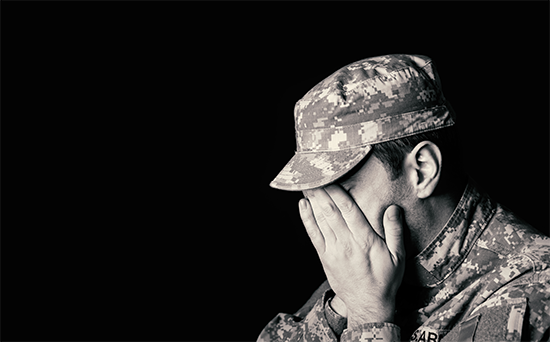
October-
November 2016
Moving Forward
------------------
|






First Aid for Vets: It's Time to Do Something
By Edward E. Moody and Chaplain (LtCol) David Trogdon, U.S. Army, Retired
If you are old enough to remember, go back in time and think about the way you felt on September 11, 2001. We were all moved when we saw the World Trade Center towers fall, the smoke rise from the Pentagon, and heard of the heroism demonstrated on United Airlines Flight 93 over Pennsylvania. As the sun began to set that day, many of us thought, “Someone must do something!”
The men and women of the United States military immediately began to do something. The USS Enterprise had been heading home after a six-month deployment. As the crew watched the events unfold that day, the Enterprise, without orders, was turned around and headed to the waters off Southwest Asia. Other service personnel went into action as our nation began to respond. More than 5.2 million people have enlisted in the military since 9/11. Fifteen years later, the memories of that day have faded. Many have forgotten what they thought and how they felt.
That is not the case for those who chose to do something in the aftermath of these events. More than 2.5 million service personnel have served in Operation Enduring Freedom (OEF), Operation Iraqi Freedom (OIF), and Operation New Dawn (OND). Many have paid a high price. More than 6,852 people have lost their lives, and more than 1,572 have lost at least one limb. More than 253,330 have suffered a traumatic brain injury.
Many who escaped physical injury struggle with the trauma they experienced. In one survey, 75% of select military units reported receiving incoming artillery, rocket, or mortar fire. Around 60% reported being shot at, and at least 50% had an IED or booby trap explode near them. Fifteen percent reported being directly responsible for the death of enemy combatants. Three-quarters knew a service member who was killed or seriously wounded. Half report seeing dead or seriously injured Americans, and half have had a friend seriously injured or killed. From 2004 to 2012 there was a 400% increase of Post Traumatic Stress Disorder (PTSD) diagnosis. Others who do not meet the criteria for PTSD will struggle with post-traumatic stress.
Do Something for Active Duty Personnel and Veterans
Long ago a Civil War soldier said, “People at home owe a debt to the soldiers that they can never pay. Let them do whatever they may, they can never cancel the obligations.” It is time for us to do something for our active duty personnel and veterans who are giving and have given so much.
During Deployment
But what can we do for service personnel who are so far away? We can support them on their deployment by helping their family. Many service members worry about their families when they are away. Are they safe, are they taken care of? It is a good idea to check in with a spouse weekly to see how they are doing when their loved one is deployed. We can help ease the burden by watching their kids while a parent shops or takes a bit of time for himself or herself. We can help by spending some time with kids whose parents are on active duty. At least 700,000 children have at least one parent who has been deployed.
After Deployment
Once a service member returns home you can help by just hanging out with your friend or family member who has been deployed. Give them some grace if they seem a bit irritable or struggle in certain situations. Realize they live with a new normal. What you think of as a big deal, they may not since no one is dying or at risk of dying. Problems may seem a little different to them. Yet, they may struggle with memory issues and certain sights and smells.
Guard against stupid questions like, “So did you kill anyone?” You might even pounce on those who make insensitive remarks by asking them how they might like to be reminded, at a family get-together or barbecue, of one of the worst days of their life at.
Help your service member or veteran realize he or she is normal. After seeing and experiencing some of the things our service members have, they’d be abnormal if they could sleep normally and not be a bit jumpy.
Point Them to God
You may have never experienced a combat deployment, but if you are a Christian you know the One who can help them—the One who walks through the valley of the shadow of death. Encourage your friends to call upon God to help them. One of the most effective interventions used today is called Mantram Repetition Program. It is a technique that is simply praying when under great stress. It is nontoxic, inexpensive, and it works. Veterans have used it to help with intense memories or after a cue of a traumatic event.
One aspect is prayer. The veteran experiences a stressor and prays something like “Lord Jesus Christ, Son of God, have mercy on me.” We believe that one of the reasons it works is that Jesus is our Helper (John 15:16) and with us who are believers (Matthew 18:20). However, the real key is that we must know Jesus or such techniques are unlikely to help long-term with the stress.
We could benefit from the command of Lieutenant General George S. Patton during World War II when the Battle of the Bulge was not going well. He said, “Urge all men to pray, not alone in church, but everywhere...Pray when driving...Pray when fighting...Pray alone...Pray with others...Pray by night and pray by day...Pray for the cessation of immoderate rains, for good weather for battle...” His point was to pray frequently and specifically. Such prayers can help those we care about today as well.
The memories of 9/11 have faded, but the impact is still with us. Let’s do something for those who have so ably served us by being there for them before, during, and after combat deployments.
About the Writers: Dr. Eddie Moody is an associate professor at North Carolina Central University. He holds a Ph.D. in counselor education. He pastors Tippett's Chapel FWB Church in Clayton, North Carolina.
Lieutenant Colonel David Trogdon recently retired from the US Army after 33 years of military service. He currently serves with CRU military and ministers to soldiers, military families, wounded warriors and veterans. Order your copy of First Aid for Veterans today: www.RandallHouse.com.
|
|

